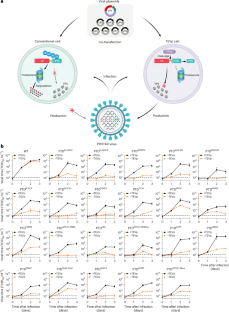Proteolysis-targeting influenza vaccine strains induce broad-spectrum immunity and in vivo protection
IF 19.4
1区 生物学
Q1 MICROBIOLOGY
引用次数: 0
Abstract
Generating effective live vaccines from intact viruses remains challenging owing to considerations of safety and immunogenicity. Approaches that can be applied in a systematic manner are needed. Here we created a library of live attenuated influenza vaccines by using diverse cellular E3 ubiquitin ligases to generate proteolysis-targeting (PROTAR) influenza A viruses. PROTAR viruses were engineered to be attenuated by the ubiquitin–proteasome system, which mediates viral protein degradation in conventional host cells, but allows efficient replication in engineered cell lines for large-scale manufacturing. Depending on the degron–E3 ligase pairs, viruses showed varying degrees of attenuation. In animal models, PROTAR viruses were highly attenuated and elicited robust, broad, strain-dependent humoral, mucosal and cellular immunity. In addition, they provided cross-reactive protection against homologous and heterologous viral challenges. This study provides a systematic approach for developing safe and effective vaccines, with potential applications in designing live attenuated vaccines against other pathogens. Diverse cellular E3 ubiquitin ligase–degron pairs are used to generate live attenuated influenza vaccines. Attenuation and humoral, mucosal and cellular immune responses were characterized in mouse and ferret models.


蛋白水解靶向流感疫苗株诱导广谱免疫和体内保护
由于安全性和免疫原性方面的考虑,从完整的病毒生产有效的活疫苗仍然具有挑战性。需要能够以系统的方式应用的方法。在这里,我们通过使用不同的细胞E3泛素连接酶来产生蛋白水解靶向(PROTAR)甲型流感病毒,建立了一个流感减毒活疫苗库。PROTAR病毒被泛素-蛋白酶体系统设计为减毒,该系统介导病毒蛋白在常规宿主细胞中的降解,但允许在工程细胞系中进行大规模生产的有效复制。根据degron-E3连接酶对的不同,病毒表现出不同程度的衰减。在动物模型中,PROTAR病毒被高度减毒,并引发了强大的、广泛的、菌株依赖的体液、粘膜和细胞免疫。此外,它们还提供了对同源和异源病毒攻击的交叉反应保护。本研究为开发安全有效的疫苗提供了一种系统的方法,在设计针对其他病原体的减毒活疫苗方面具有潜在的应用前景。
本文章由计算机程序翻译,如有差异,请以英文原文为准。
求助全文
约1分钟内获得全文
求助全文
来源期刊

Nature Microbiology
Immunology and Microbiology-Microbiology
CiteScore
44.40
自引率
1.10%
发文量
226
期刊介绍:
Nature Microbiology aims to cover a comprehensive range of topics related to microorganisms. This includes:
Evolution: The journal is interested in exploring the evolutionary aspects of microorganisms. This may include research on their genetic diversity, adaptation, and speciation over time.
Physiology and cell biology: Nature Microbiology seeks to understand the functions and characteristics of microorganisms at the cellular and physiological levels. This may involve studying their metabolism, growth patterns, and cellular processes.
Interactions: The journal focuses on the interactions microorganisms have with each other, as well as their interactions with hosts or the environment. This encompasses investigations into microbial communities, symbiotic relationships, and microbial responses to different environments.
Societal significance: Nature Microbiology recognizes the societal impact of microorganisms and welcomes studies that explore their practical applications. This may include research on microbial diseases, biotechnology, or environmental remediation.
In summary, Nature Microbiology is interested in research related to the evolution, physiology and cell biology of microorganisms, their interactions, and their societal relevance.
文献相关原料
公司名称
产品信息
索莱宝
ELISA stop solution
 求助内容:
求助内容: 应助结果提醒方式:
应助结果提醒方式:


